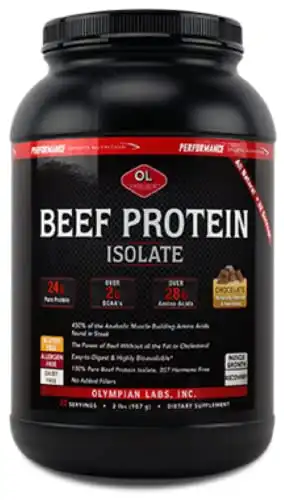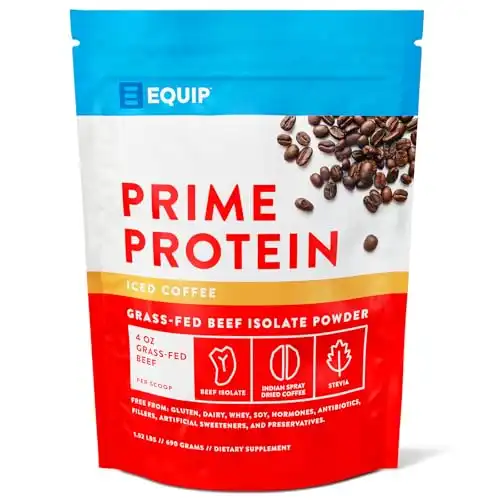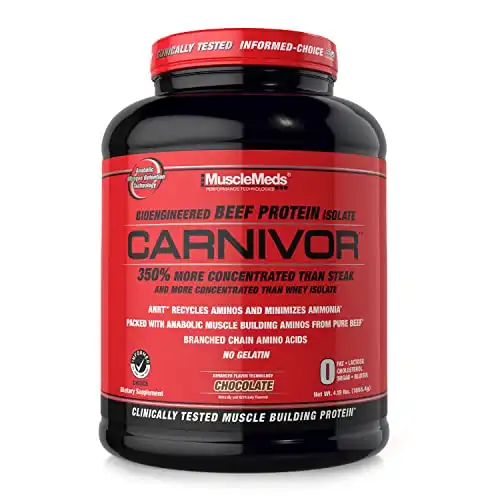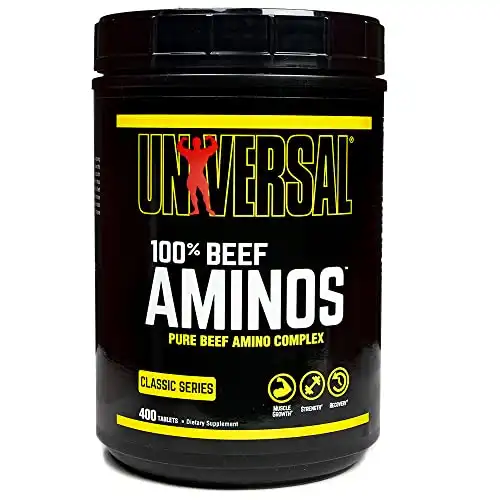5 Benefits of Beef Protein Isolate for Muscle Growth and Recovery
Beef Protein Isolate, derived from beef, offers high protein content, unique amino acids, and essential vitamins and minerals for muscle recovery and growth, making it a versatile dietary supplement for fitness enthusiasts with specific health goals.

Navigating the world of protein supplements can feel like a maze, but understanding the unique benefits of each type is key to optimizing your fitness regimen. Beef Protein Isolate, derived from beef, boasts a high protein content and specific amino acid profile, providing a distinct approach to muscle recovery and growth.
Disclosure: As an Amazon Associate, this site earns from qualifying purchases. Thank you!
How Beef Protein Isolate is Made

Ever wondered how beef transforms into the powdered supplement lining the shelves of health stores? Here’s an insight into the intriguing process behind making beef protein isolate, a potent aid for muscle recovery and growth.
The Extraction Process
The journey begins with beef trimmings and abundant leftovers from meat processing. These trimmings, rich in protein but low in fat, undergo hydrolysis, breaking protein bonds on a molecular level. This process separates protein from fats, carbs, and other components, ensuring high-quality protein rich in essential amino acids, crucial for muscle building and repair.
- Collection of Raw Materials: High-quality, lean trimmings are sourced from butcheries and meat processing units, ensuring a top-notch final product.
- Hydrolysis: Enzymes break down protein into smaller peptides and amino acids, aiding digestion and retaining essential nutrients.
- Separation and Filtration: Proteins are separated from fats and by-products through centrifugation and filtration, akin to sifting flour for fine particles.
- Spray Drying: Liquid protein is transformed into powder through spray drying, evaporating moisture in a hot chamber.
- Quality Checks and Packaging: The powder undergoes rigorous testing for purity, nutritional value, and safety before packaging and sealing.
This meticulous process from cow to powder ensures that beef protein isolate is not only high in protein but also pure, making it an excellent supplement for those looking to enhance their fitness routines, especially if you’re following a carnivore diet or have dairy sensitivities.
Nutritional Profile of Beef Protein Isolate
For those delving into the details of beef protein isolate, understanding its nutritional essence is key to maximizing its benefits for muscle growth, recovery, and overall dietary enrichment.
Macronutrient Breakdown
Beef protein isolate stands out for its lean profile, offering approximately 23-25 grams of protein per 30-gram serving. Stripping away excess fats and carbohydrates, it provides concentrated protein essential for muscle development, without added calories or digestive discomfort.
Compared to whole beef, the isolate form offers pure muscle-building benefits, akin to distilling beef down to its most potent components.
Amino Acid Profile
In comparison to whey protein, beef protein isolate excels in providing essential amino acids like glycine and arginine, vital for collagen synthesis and heart health. This specialized amino acid profile caters to specific bodily needs, ensuring optimal support for various functions.
Key Vitamins and Minerals
Beyond protein, beef protein isolate offers a wealth of essential nutrients. It’s a notable source of iron, crucial for oxygen transport and sustained energy levels. Additionally, it provides ample Vitamin B12, supporting brain health and vitality, akin to a cellular battery charger. Zinc, another prominent mineral, bolsters immune function, and aids in wound healing, offering added protection in uncertain times.
Embracing beef protein isolate means not just focusing on muscle growth but also nourishing your body with a comprehensive blend of nutrients, supporting overall health from brain function to immune resilience. It’s a convenient fusion of protein shakes and multivitamins in one sip.
Benefits of Beef Protein Isolate
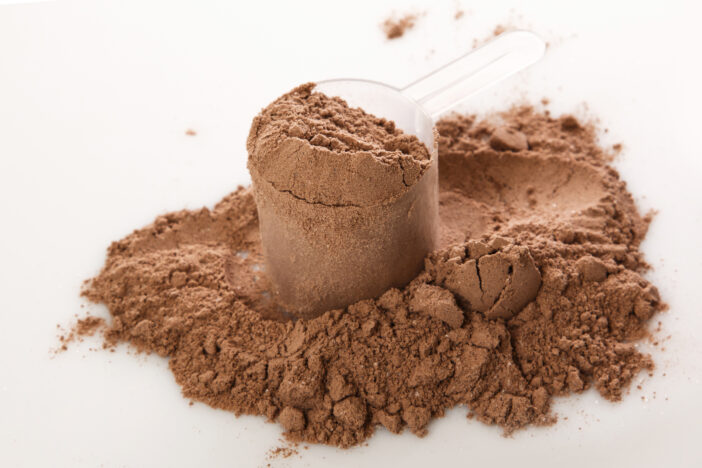
In the realm of fitness and nutrition, understanding the distinct advantages of beef protein isolate amidst a sea of dietary supplements is essential for optimizing health and fitness routines. Let’s delve into why it’s a standout choice.
Muscle Support and Recovery
After a strenuous workout, muscles crave the nutrients necessary for recovery and growth. Beef protein isolate’s rich amino acid profile, particularly glycine and arginine, aids in muscle synthesis and repair, facilitating more efficient recovery. Its unique absorption rate and amino acid composition further enhance the body’s natural repair processes.
Lean Mass and Strength Enhancement
For those aiming to increase lean muscle mass and strength, beef protein isolate offers a potent solution. Research shows that a protein-enriched diet, including beef protein, isolate, alongside resistance training, significantly enhances lean tissue mass and muscle strength. Incorporating it into your diet can be transformative for strength and muscle-building goals.
Weight Management Support
High-protein supplements like beef protein isolate play a crucial role in weight loss efforts by promoting satiety and increasing metabolic rate. Enjoying protein-packed smoothies can curb hunger, leading to reduced caloric intake and preserving lean muscle mass during weight loss, ensuring fat loss predominates.
Dietary Versatility
Beef protein isolate serves as an excellent alternative to whey protein for individuals with dietary restrictions such as lactose intolerance or those following specific diets like paleo. Its high protein content offers muscle-building benefits without the digestive issues associated with dairy, making it adaptable to diverse dietary preferences and needs.
Integrating beef protein isolate into your diet can be a strategic choice, whether your goals involve muscle building, strength enhancement, weight loss, or accommodating dietary restrictions. Remember, selecting the right supplement is pivotal for achieving fitness objectives. Choose wisely to witness your goals materialize.
Beef Protein Isolate vs. Other Protein Sources

Navigating the protein supplement landscape can be overwhelming, with whey protein often taking the spotlight. But where does beef protein isolate fit in? Let’s compare it to other popular options.
Comparing Beef Protein to Whey Protein
Whey protein is celebrated for its rapid absorption, delivering amino acids swiftly to muscles. With 3.496 grams of essential amino acids per 100g serving, it’s a muscle-building powerhouse. In contrast, beef protein isolate offers 1.94 grams of these amino acids per 100g, along with unique ones like proline and hydroxyproline. Ideal for those with dairy sensitivities or following a paleo lifestyle, it provides a different amino acid spectrum.
Beef Protein Isolate and Plant-Based Proteins
Plant-based proteins, like pea or rice protein, cater to vegans and vegetarians but often lack a complete amino acid profile. Beef protein isolate stands out with its complete profile, appealing to athletes and fitness enthusiasts seeking muscle optimization while adhering to dietary preferences.
Why Choose Beef Protein Over Others?
For those with dietary sensitivities or on paleo diets, beef protein isolate offers a robust alternative rich in unique amino acids crucial for muscle health. It’s also highly digestible, making it suitable for those who may react to whey. Plus, its savory flavor provides a refreshing change from sweeter options.
In selecting your protein source, consider your dietary needs, preferences, and fitness goals. Whether you prioritize rapid absorption, dietary compatibility, or ethical considerations, there’s a protein powder suited to you. Experimenting with different options can introduce variety and support your health and fitness journey.
Have you explored mixing up your protein sources to find what works best for you? Trying various options can not only meet your nutritional needs but also expand your culinary horizons. Remember, the best protein is one that seamlessly integrates into your lifestyle, supporting your health and fitness goals.
Who Can Benefit from Beef Protein Isolate?

Curious if beef protein isolate suits your needs? This nutritional powerhouse offers distinct advantages, catering to specific health goals and dietary preferences. Let’s explore who stands to gain the most from incorporating beef protein isolate into their diet.
Athletes and Fitness Enthusiasts
For those dedicated to fitness, beef protein isolate aids in muscle recovery and growth, thanks to its rich amino acid profile, including approximately 19.4g of BCAAs per 100g. Its rapid absorption and digestibility make it an ideal post-workout choice, promoting faster recovery and muscle development.
Individuals with Specific Dietary Needs
Those with dietary restrictions like lactose intolerance or dairy allergies, or those adhering to paleo or carnivore diets, find beef protein isolate a valuable ally. Unlike whey protein, it offers a dairy-free, high-quality protein source, aligning perfectly with dairy-free or carnivore lifestyles.
Those Looking to Increase Protein Intake
Whether you aim to build muscle, lose weight, or simply boost daily protein intake, beef protein isolate offers a convenient solution. Its high protein content and low-calorie profile facilitate meeting nutritional needs without excess fat or calories. Versatile in usage, it can easily be incorporated into various recipes, from smoothies to homemade protein bars.
Beef protein isolate holds promise for individuals across diverse dietary and fitness spectrums, offering tailored support for specific goals and preferences. Assessing your dietary needs and goals can help determine if beef protein isolate is the right fit for you. Ready to uncover the missing piece in your nutritional puzzle? Consider beef protein isolate for your dietary journey.
How and When to Use Beef Protein Isolate
In the maze of dietary supplements, choosing the right protein source can be daunting. If beef protein isolate is on your radar, understanding its optimal use is crucial for maximizing its benefits.
Timing for Consumption
Timing is crucial for maximizing the effectiveness of beef protein isolate, especially for muscle recovery and growth. Here’s when to use it for optimal results:
- Post-Workout Recovery: Consume beef protein isolate immediately after exercise to fuel muscle repair and growth, as its amino acids kickstart the recovery process.
- Between Meals: Combat hunger and prevent muscle breakdown by incorporating beef protein isolate between meals, ensuring a steady protein intake throughout the day.
- Before Bed: Enhance nighttime recovery by taking beef protein isolate before sleep, providing muscles with essential amino acids for repair and growth.
- If Lactose Intolerant: Opt for beef protein isolate over dairy-based proteins like whey to support muscle growth without discomfort.
Incorporating Beef Protein into Your Diet
Now, let’s explore how to incorporate beef protein isolate into your diet for both effectiveness and enjoyment. Here are some delicious ways to make it a regular part of your nutrition plan:
- Smoothies: Add a scoop of beef protein isolate to your favorite smoothie for a protein boost without altering the taste.
- Yogurt: Mix beef protein isolate into Greek yogurt for a protein-packed snack or breakfast option.
- Homemade Protein Bars: Customize homemade protein bars with beef protein isolate for a cost-effective and convenient snack.
- Pancakes: Substitute part of the flour with beef protein isolate in the pancake mix for protein-rich pancakes to start your day.
Choosing a High-Quality Beef Protein Isolate Supplement
After learning about the benefits of beef protein isolate, selecting the right supplement becomes crucial for achieving your fitness goals and maintaining your dietary preferences. Here’s what to prioritize when choosing a supplement:
Label Inspection
Focus on the protein content per serving, aiming for over 20 grams without unnecessary fillers or additives. Ensure the supplement lists essential amino acids, especially BCAAs, crucial for muscle recovery. Opt for low-sugar and low-fat options to support lean protein intake. Minimize additives and artificial ingredients for a clean supplement.
Source Transparency
Look for supplements sourced from grass-fed, hormone-free cattle, reflecting ethical and sustainable farming practices. Transparency about the beef source indicates a commitment to quality. Choose hydrolyzed beef protein for enhanced digestion and absorption.
Taste and Mixability
Consider your taste preferences and how well the supplement mixes in beverages or recipes. Opt for flavors you enjoy to ensure consistency in consumption.
By prioritizing protein content, source transparency, and taste preferences, you can select a high-quality beef protein isolate supplement tailored to your needs and preferences.
Potential Drawbacks and Considerations
While Beef Protein Isolate offers notable benefits for muscle recovery and growth, it’s essential to consider potential drawbacks and factors before incorporating it into your routine.
Dietary Restrictions and Ethical Concerns
If you’re vegetarian or vegan, Beef Protein Isolate, sourced from beef, may not align with your dietary choices or ethical beliefs. Additionally, concerns about sustainability and animal welfare may arise. Individuals with beef allergies or sensitivities should also exercise caution or seek advice from a healthcare professional before using Beef Protein Isolate.
Price Point and Availability
Beef Protein Isolate often comes with a higher price tag compared to other protein sources, attributed to the processing and sourcing of high-quality beef. Before purchasing, consider its value relative to your budget and fitness goals. While availability may vary, the growing demand for diverse protein sources is improving accessibility.
In deciding whether to incorporate Beef Protein Isolate into your diet, consider these potential drawbacks alongside its benefits. Ultimately, choose what aligns with your dietary, ethical, and budgetary considerations to support your overall wellness journey.

